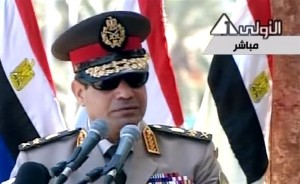 The head of Egypt’s armed forces has said that his message to the supporters of ousted President Mohammed Morsi is that “there is room for everyone”.
The head of Egypt’s armed forces has said that his message to the supporters of ousted President Mohammed Morsi is that “there is room for everyone”.
Gen Abdul Fattah al-Sisi urged them to help “rebuild the democratic path” and “integrate in the political process”.
But he also warned the military would not be silent in the face of violence.
Later, at least 36 detained members of the Muslim Brotherhood were killed when they tried to escape during their transfer to a prison outside Cairo.
Initially, the interior ministry said they died in an exchange of fire after some of them took a military officer hostage and the convoy of prison vehicles, transporting a total of 612 detainees to Abu Zaabal prison in Qalyubia province, was attacked by unidentified gunmen.
But later the ministry said the prisoners died from the effects of inhaling tear gas, which was fired when the escaping detainees took a police officer hostage. He was freed, but was badly injured, it added.
A legal source told the Reuters news agency that the Brotherhood members had suffocated in the back of a crammed police van.
The interior ministry separately said so-called “people’s committees”, which have been set up by residents of some areas to provide security, would be banned because some had been used for vigilante activities.
Meanwhile, Mena reported that 79 people were killed and 549 wounded in violence across the country on Saturday.
That raised the nationwide death toll since Wednesday, when security forces forcibly cleared two pro-Morsi protest camps in Cairo, to more than 830, including 70 police and soldiers.
‘Torching the nation’
Gen Sisi deposed Mr Morsi on 3 July, saying the military could not ignore the millions of people who had been demanding the resignation of Egypt’s first democratically elected president.
Before security forces launched the operation to disperse the Cairo sit-ins, the armed forces chief asked millions of people to take to the streets to give him a “mandate” to fight “violence and terrorism”, an apparent reference to the Muslim Brotherhood, the Islamist movement to which Mr Morsi belongs.
In a speech to army and police officers on Sunday, Gen Sisi warned that the military would not allow further violence after the latest unrest.
“We will not stand by silently watching the destruction of the country and the people or the torching the nation and terrorising the citizens,” he quoted as saying on the military’s Facebook page.
But the general also appeared to strike a conciliatory tone towards his opponents, urging them to join in the political process.
“There is room for everyone in Egypt, and we are cautious about every drop of Egyptian blood.”
The Brotherhood has called for daily demonstrations since security forces cleared its protest camps in Cairo on Wednesday and declared a state of emergency.
More than 600 people were killed during the operations, including dozens of security forces personnel, and at least another 173 died on Friday during a “day of rage” called by the Brotherhood .
Brotherhood members detained
Also on Sunday, the interim government met to discuss the unrest.
Afterwards, Information Minister Dorreya Sharaf al-Din said the cabinet wished to express its regret the loss of life, but would continue to confront “terrorism” firmly.
She added that the cabinet would name several streets and squares after soldiers killed in the recent unrest, and review the legal status of al-Jazeera TV, which she accused of threatening security and stability.
The cabinet is also believed to have discussed Prime Minister Hazem Beblawi’s proposal for the legal dissolution of the Brotherhood.
The 85-year-old Islamist movement was banned by Egypt’s military rulers in 1954, but registered itself as a non-governmental organisation in March in response to a court case bought by opponents who contested its legal status.
The Brotherhood also has a legally registered political wing, the Freedom and Justice Party, which was set up in June 2011 as a “non-theocratic” group after the uprising that forced President Hosni Mubarak from power.
At a news conference on Sunday, the interim Foreign Minister, Nabil Fahmy, showed video clips apparently showing armed protesters firing on security forces in Cairo. He said the government was faced with an attempt to “shake the foundation of the state”.
More than 1,000 Brotherhood members have been detained in raids since Wednesday, with officials saying bombs, weapons and ammunition have been seized. Some 300 were held in several cities on Sunday, including Cairo, Alexandria, Assiut and Suez, security sources said.
EU concerns
Earlier, the European Union said it would be reviewing its relationship with Egypt’s interim authorities at an emergency meeting next week.
The presidents of the European Commission and European Council said in a joint statement calls for democracy and fundamental rights “cannot be disregarded, much less washed away in blood”.
It added that the violence and killings “cannot be justified nor condoned”.
The EU has pledged several billion dollars in loans and grants to Egypt.
Mr Fahmy sought to pre-empt any attempt by the West to compel the interim authorities to back down by announcing that he would be reviewing all foreign assistance.
“I want to determine what is useful and what is not and what aid is being used to pressure Egypt and whether this aid has good intentions and credibility. We will proceed based on our findings,” he told reporters.
BBC

Leave a Reply
You must be logged in to post a comment.